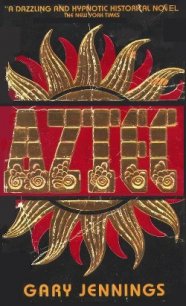Aztec Blood - Jennings Gary (читать хорошую книгу полностью txt) 📗
"To make sure I get what I want," she said, "I shall keep a dagger hidden in my petticoats."
?Ay de mi! I had married a jungle cat.
ONE HUNDRED AND THIRTY-TWO
Five months later, recovered from my wounds—and the hot oil to my face—we left the City of Mexico to board the treasure fleet at Veracruz.
Don Diego had welcomed me into the family without meeting my eye. Mateo had contrived a heroic feat for me in the riots, one only slightly less awesome than his own singlehanded defense of the palace. With my ancient bloodline, which was in a small way tied to the throne of Spain, and my recent act of heroism—along with a substantial contribution to the king's war purse—I was ordered to the Royal Court in Madrid to assume a position on the Council of the Indies for three years. With the travel time between Europe and the colony, and visits to my peninsular relatives, it would be a good five years before we returned. By that time, all but the legend of Cristo the Bastardo will have faded.
Mateo sailed on the same ship. Extricating our secret hoard from the cave, he boasted that he would build a great arena and fill it with water in Madrid. Then he would perform before the king the great sea battle for Tenochtitlan. Would I worry what mischief this would result in? Si.
You say this is all a fairy tale? That the poor street child cannot become a nobleman with a beautiful wife? Eh, amigos, was not Amadis of Gaul cast out as a child? And did he not win a princess and a kingdom?
Do you expect any less from Cristo the Bastardo?
Have you forgotten that a great autor of plays was manipulating all the events to ensure that there was a happy ending? I told you it was a wondrous tale, as colorful and exciting as any of the chivalric romances that drove poor Don Quixote loco.
And in truth, I have not told it all. I could not, of course. You see, like Jaime the lepero, I am such a product of my youth on the streets that I could not help lying. Amigos, forgive me, but I confess that sometimes in my secret narrative, I have even lied to you.
I leave now—
Eh, wait, you say. I have left out part of the story. You want to know why the guards did not believe Luis when he told them that he was not Cristo the Bastardo.
Well, you see, he never told them he was really Luis. He tried, but the words would never come out. Mateo told me the reason before Elena and I boarded the galleon for Seville. When he bent over Luis on the floor of the viceroy's palace, he cut out Luis's tongue.
It is now time to put down my pen. As a high nobleman of Spain and New Spain, I am now a man of the sword and not the quill.
?Vaya con Dios, amigos!
AFTERWORD
The major historic events related in the novel occurred during the seventeenth century in Mexico, then known as New Spain. Incidents such as the manipulation of the price of maize resulting in the food riot in which the viceroy's palace was attacked, the pirate raid on Veracruz, the Jaguar Knight murder cult, and the adventures of the nun-bandit Catalina de Erauso were of this period.
Elena, of course, was inspired by Sor Juana Ines de la Cruz. Beautiful, brilliant, a bastarda ("daughter of the Church" was how her birth certificate put it), the great poetess threatened to disguise herself as a man and sneak into a university because women were not permitted an education.
The author has been liberal in presenting the chronology of the events.
ABOUT THE AUTHOR
Gary Jennings was known for his intensive research, which often included rigorous and sometimes hazardous travels—exploring every corner of Mexico for his Aztec novels, retracing the wanderings of Marco Polo for The Journeyer, joining nine different circuses for Spangle, and roaming the Balkans writing Raptor.
Copyright © 2001 by Eugene Winick, Executor, Estate of Gary Jennings
ISBN: 0-812-59098-8




